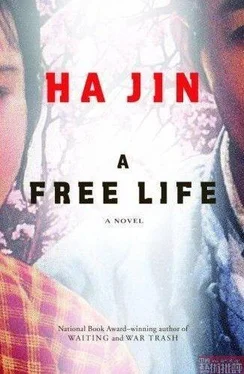This trip, however, excited Nan in a different way. He planned to visit his friend Danning in Beijing, then his parents in Harbin, where Beina must be living as well. He hadn't told any of them about his return and meant to give them a surprise.
He brought along a poetry anthology, The Voice That Is Great Within Us, which he read from time to time during the flight. But he dozed off frequently since he hadn't slept well the night before. He was glad he was seated in an exit row and had more leg room. On his left lounged a lumpy-faced man, who was on his way back to his job in Shanghai but would stop in Beijing for a day or two on business. The man introduced himself as Yujing Fang and complained he couldn't smoke the whole way. Because he was in a window seat, unable to talk to others, now and then he tried to converse with Nan. He said he had earned an M.B.A. from the University of Chicago and worked for GE in China. But his wife and two children lived in New Jersey, and he could visit them a few times a year, plane fares paid by the company.
"That's hard," Nan said. "I mean, to be separated from your family."
"Yes, in the beginning just the phone bills would cost five hundred dollars a month, but now I use phone cards and we're accustomed to the separation."
"Why don't you find a job in the States?"
"My position in Shanghai is important and lucrative. I manage a branch of our company there."
"Do they pay you an American salary?" "Of course."
"Then you must be a millionaire."
"Truth be told, I don't count pennies when I go shopping." "Tell me, what are the fashionable gifts in China at the moment?" " Color TV sets are still presentable. Air conditioners, digital cameras, computers-ah, yes, vitamins." "Do people take vitamin pills?"
" Sure. Twenty bottles of multiple vitamins can grease a large palm. Wisconsin ginseng is always popular too."
"Life must be better for many people in China now. Few of them could afford those supplements ten years ago."
"Another very expensive present is just coming into fashion in Shanghai."
" Which is?"
"Enemas."
" What did you say?"
"Enemas, having your intestines rinsed once in a while."
"Why?"
"To prevent cancer and other diseases." "But how can they be a gift?"
"That's easy. You buy a book of tickets for enemas at a hospital and give it to another person who can go there for the treatment."
"I see." Nan chuckled, still thinking this was odd. Maybe only people in Shanghai would use such a present.
"It's expensive, though," said Yujing. "Only rich people, like entrepreneurs, athletes, and actors, can afford to have an enema regularly."
"Still, how could I give my dad a gift like that?"
"Oh, I thought you meant to bribe an official or some big shot. Actually, this enema thing might just be a passing fad. Last year electric shavers were all the rage, but they're already passe. By the way, for youngsters, brand-name clothes and shoes are always welcome."
"Like what kind?"
"Like Polo shirts and Nike sneakers."
Nan felt lucky that he hadn't bought any presents for his parents and siblings. If he had, he'd have picked two or three foolproof cameras, a few calculators, a pair of electronic keyboards for his nephew and niece, and a dozen wristwatches. According to his fellow traveler, most of those were no longer appropriate. Nan had $3,000 cash on him, planning to give each member of his family a few banknotes, real American dollars. That was a bad idea, according to Pingping, who feared that her parents-in-law would keep the money quietly and then tell people that Nan hadn't brought back anything for them. At most the old man and woman, both tightfisted, might spend some of the cash on food, for which no one could know they had taken money from Nan. It would have been far better if he had bought them some high-quality clothes so that everyone could see it plainly when his parents donned an American coat or jacket or hat. But Nan had left in too much of a hurry to visit any clothing stores. Besides, he knew nothing about brand names and wanted to travel light.
For the rest of the trip he was reluctant to talk more with Yujing, fearing the fellow might ask him about his profession. He wouldn't mind saying he was a restaurateur, but it would be embarrassing to admit he had only one employee. So whenever Yujing tried to chat again, Nan would appear tired and give a yawn. He kept his eyes shut and nodded off most of the time like the old woman with knotted hands seated on his right, who slept nearly all the way.
BEIJING was now hardly recognizable to Nan. He got out of a taxi at the train station and found out the schedule of the train bound for Harbin. He planned to stay one day in the capital and depart for home the next morning. Outside the station, so many automobiles were running on the streets that he was a bit unnerved and stopped to observe the rushing traffic for a while. In the distance several cranes stood motionless, like dark skeletons, over buildings encaged by scaffolding. Around him people were hustling and bustling. To his surprise, there were yellow cabs here too, like in New York City. The plaza before the temple-like station was more crowded and more chaotic than it had been twelve years before when he had come to apply for a visa for the United States. Here and there gathered knots of young men in gray- or blue-collared T-shirts, some sitting on bedrolls and smoking pensively, and some lying on newspaper spread on the concrete slabs and dozing off. Apparently these country people had come here to seek work. Their leathery faces showed the kind of numbness that reminded Nan of the homeless in Atlanta. He wondered if there were soup kitchens in Beijing. Maybe not.
Nan called Danning Meng from a pay phone. On hearing of his arrival, Danning turned ecstatic and gave him directions to his home, insisting Nan stay with him. Nan agreed. He hailed a taxi and headed for Danning's place in the Hsidan area. There was so much traffic that bicycles seemed to move faster than automobiles. Now and then the cabdriver beeped his horn at the pedestrians who didn't step aside fast enough to make way for the car. At a red light a few vendors stepped over to hawk grapes, ice lollies, peaches, tomatoes.
To Nan 's amazement, Danning lived in a small traditional compound with a scarlet gate, which, topped with black ceramic tiles, was in the middle of a high brick wall. A leaf of the gate was ajar, so Nan went in unannounced. Inside was a small stone-flagged quadrangle, formed by four houses. He hadn't expected Danning to live in such a spacious home, which was old-fashioned, a rare find nowadays. Two crab apple trees stood beside the entrance to the main house, and several wooden pots planted with kumquats and bamboos sat alongside the wing houses. "Anybody home?" shouted Nan.
Danning Meng stepped out of his living room and hugged Nan so tightly that the guest almost let out a moan. "At last we're together again!" the host said with emotion. Though thicker and a bit gray now, he hadn't aged much.
" You live like the nouveau riche, such a nice place," Nan said, beaming.
"I paid thirty thousand dollars for this piece of property, but we may have to move soon." Danning couldn't stop looking at Nan, and his smiling eyes curved a little, their outside corners drooping. He took Nan into the living room furnished with antique carved furniture.
"Why give up this place? It's a luxurious home, better than any apartment," Nan said the moment he sat down on a sofa.
" A company wants to build a hotel in this area, so the entire neighborhood will be gone in a year or two."
"What a shame. This quadrangle is the real old Beijing."
Danning's daughter, Weiwei, stepped in, called Nan "Uncle Wu," and then told her father that she had dragged Nan 's suitcase into the guest room, which was in the east wing house and adjacent to Danning's study and their family room. The girl wore glasses and looked studious and undernourished. Though already fifteen, she was so thin that she seemed well under the age of puberty. Her father told her to prepare a basin of warm water so that Uncle Wu could freshen up.
Читать дальше












